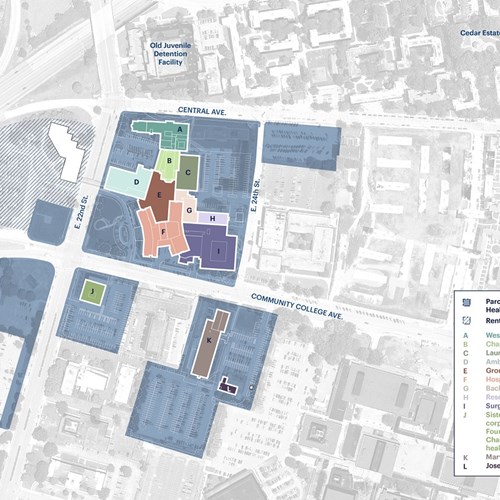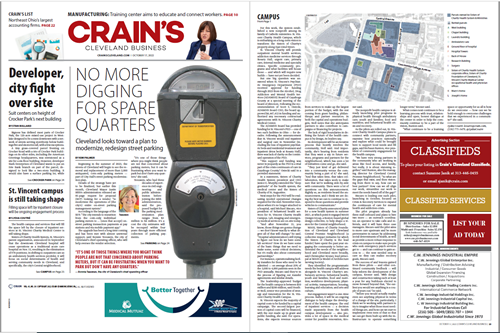Crain's Cleveland Business features St. Vincent Charity Health Campus community engagement in cover story

The vision for the St. Vincent Charity Health Campus, as announced on September 14, 2022, is to transform the Sisters of Charity’s property on East 22nd Street, including St. Vincent Charity Medical Center, into a vibrant hub that promotes holistic health and wellness through health care and services that address the social determinants of health. Crain’s Cleveland Business recently published a cover story featuring the comprehensive year-long community voice and planning process that began in June 2021 in partnership with MASS Design Group.
The following story appears in the October 17, 2022, edition of Crain's Cleveland Business.
 St. Vincent campus will be ongoing engagement process
St. Vincent campus will be ongoing engagement process
By LYDIA COUTRÉ, Crain's Cleveland Business
https://www.crainscleveland.com/health-care/st-vincent-campus-will-be-ongoing-engagement-process
The health campus and services that will fill the space left by the closure of inpatient services at St. Vincent Charity Medical Center is still taking shape.
Sisters of Charity Health System, St. Vincent's parent organization, announced in September that the downtown Cleveland hospital will cease operations as a traditional acute care hospital on Nov. 15, resulting in the elimination of 978 positions. In shifting to outpatient care as an ambulatory health services provider, it will focus on social determinants of health and serving community needs in Cleveland, and specifically, the city's Central neighborhood.
For this work, the system established a new nonprofit among its family of Catholic ministries: St. Vincent Charity Health Campus, which is embarking on a long-term vision to transform the Sisters of Charity's property along East 22nd Street.
St. Vincent Charity will provide outpatient mental health services, addiction medicine services through Rosary Hall, urgent care, primary care, internal medicine and specialty clinics. Specific community programs and what facilities will house those — and which will require new builds — have not yet been decided.
But one big question was answered when St. Vincent's Psychiatric Emergency Department (PED) received approval for funding through 2023 from the Alcohol, Drug Addiction and Mental Health Services (ADAMHS) Board of Cuyahoga County at a special meeting of the board of directors. Following the recommendation of Scott S. Osiecki, ADAMHS Board CEO, the board approved $4,447,412 in funding and authorized any necessary contractual agreements with St. Vincent Charity Medical Center.
The ADAMHS Board has provided funding for St. Vincent's PED — one of two such facilities in Ohio — for decades. Following the announcement that St. Vincent would end inpatient and surgical care in November (including the loss of inpatient psychiatric beds and residential treatment and inpatient detox beds at Rosary Hall), there was lack of clarity on the continued operation of the PED.
"This support and funding was never in jeopardy as the PED is a vital part of the crisis continuum of care in Cuyahoga County," Osiecki said in a provided statement.
In a statement, Sisters of Charity Health System president and CEO Janice G. Murphy extended the "deep gratitude" of the health system, the medical center and the Sisters of Charity of St. Augustine.
Next steps for the PED will be evaluating needed operational changes required for the mid-November transition when it's no longer attached to a hospital, said Michael Biscaro, vice president of behavioral health services for St. Vincent Charity Health Campus. Lab, imaging and emergency medical services are on-site today.
"And after November 15, you know, those things are going to change — we don't know exactly what degree all of that will change," he said. "Hospital administration's still trying to figure out how do we have some lab services? How do we have some of the basic things that we need to make some, some critical decisions, but it's really also about community partnerships."
For instance, operationalizing facility transfers for those who need to be admitted — on average about 25% of the 3,000 to 4,000 patients seen in the PED annually. Biscaro said they're in the process of figuring out transfer agreements and similar details.
The anticipated investment the health campus could attract (from a variety of sources, including private developers, service providers, grantmaking foundations and project partners) is between $50 million and $200 million, said Heather Stoll, senior vice president of strategy and innovation for the St. Vincent Charity Health Campus.
St. Vincent expects the majority of capital costs to be funded by a capital campaign. The second-largest portion of capital costs will be financed, with the rest made up in grant and public funding, she said. For operations, she expects revenue sources from services to make up the largest portion of the budget, with the rest coming from grant funding, philanthropy and partner resources. In both the capital and operations budgets, Stoll notes that she anticipates partners to also contribute to campaigns or financing for projects.
The lack of rigid boundaries in defining the future of the health campus is by design, its leaders say.
Its development will be an iterative process that heavily involves the community, Stoll said. And importantly, she's hearing from residents that they want a say in future services, programs and partners for the neighborhood, which has seen a lot of initiatives come and go, she said.
"They just kind of get delivered into a community versus the community being a part of it," she said. "And that takes time, that takes collaboration, that takes work to make sure that we're walking side-by-side with community. There were a lot of questions on this announcement. Rightly so, as residents heard the announcement, and I think we are doing the best we can to continue to respond to those questions and provide vehicles to communicate."
Sisters of Charity announced plans for a new health campus in summer 2021, at which point it engaged MASS Design Group, a Boston-based global design collective, to help shape a vision for the Central neighborhood.
MASS, Sisters of Charity Foundation of Cleveland and Cleveland Central Promise Neighborhood (a collective impact initiative for which the Sisters of Charity is the lead funder) have spent the past year engaging the community to better understand the needs of the neighborhood and Cleveland more broadly, said Christopher Kroner, lead principal at MASS (a Model of Architecture Serving Society).
They identified the programmatic needs the health campus will address alongside St. Vincent Charity's ambulatory services: behavioral health; youth and families; food and nutrition; workforce development; physical activity; transportation; housing; learning and education; and arts and culture.
But engagement wasn't a one-time process. Rather, it will be an ongoing dialogue to help shape the development of the health campus. The end of inpatient services — a decision made separately from the health campus development — also provides a lot of space in the medical center for possible renovation, Kroner said.
The nonprofit health campus is already launching pilot programs in physical health through ambulatory care; youth and families; food and nutrition; and behavioral health crisis and recovery.
As the pilots are rolled out, St. Vincent Charity Health Campus plans to connect with community partners, examine best practices nationally and explore what could be brought here to support local needs and fill gaps, said Richaun Bunton, vice president of community engagement for the health campus.
"We have very strong partners in the community who are working in areas like food access, and family, but really, it is about visioning together," said Bunton, also the managing director for Cleveland Central Promise Neighborhood. "So what are the gaps that exist, and then visioning from there to say, how can we best partner? How can we all align our work, streamline our work to meet the needs based off of the gap?"
Biscaro is leading one such pilot, launching in October, focused on Crisis & Recovery Services to expand the continuum of care for mental health and addiction crisis.
The pilot program already has three staff onboard and plans to hire two more — an outreach coordinator, an operator to take calls and referrals, and it will have three case managers. Biscaro said the pilot aims to move care upstream and be more preventative in nature by addressing social determinants of health, as well as provide a more robust response to crisis on campus to make sure people who seek emergency psych services get to — and can continue to gain access to — the next needed step in care so they can realize recovery goals, Biscaro said.
The success of and lessons gained from these pilots — and other continued community feedback — will help inform the development of the campus, Kroner said. With design and construction taking each at least a year for any buildouts elected to move forward beyond that, "the earliest you would see anything is a couple of years out," he said.
"Before you would actually maybe even see anything physical in terms of a change of the site, particularly, I think we're working with partners to try to imagine what those most needed things are, and how can we start to implement even tests of that so that we can get them built up with the infrastructure to operate something longer term," Kroner said.
What comes next continues to be a learning process with trust, relationships and open, honest dialogue at the center in order to help the community continue to be a part of the vision, Bunton said.
"What continues to be a learning space or opportunity for us all is how do we overcome — how can we be bold enough to overcome challenges that we experienced in a community?" she said.
- Sisters of Charity Health System
- News Releases
- St. Vincent Charity Health Campus
- Light of Hearts Villa
- Regina Health Center
- Sisters of Charity Foundation of Canton
- Sisters of Charity Foundation of Cleveland
- Sisters of Charity Foundation of South Carolina
- Building Healthy Communities
- Catholic Community Connection
- Early Childhood Resource Center
- Healthy Learners
- Joseph and Mary's Home
- South Carolina Center for Fathers and Families